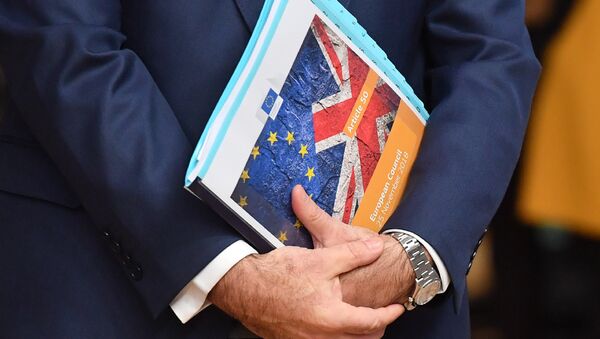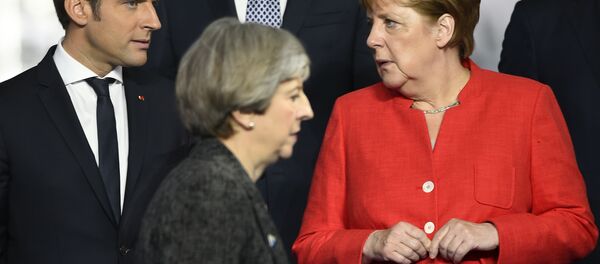On Wednesday, 200 of May's Conservatives voted in support of her government.
Meanwhile, 117 expressed a lack of confidence in it, attempting to trigger her removal from office.
Radio Sputnik has discussed this with Dr Nikos Skoutaris, an expert in conflict resolution and European Union law at the University of East Anglia.
Sputnik: Theresa May has survived this vote of no-confidence. What's next for her, though? Many have said that this is not really a victory; it's just not being defeated.
For the next twelve months, supposedly her position is secure, but at the same time, if we look at it from where we stand, when we got Brexit, not much has changed.
May doesn't seem to have a majority in the parliament to approve the withdrawal agreement. She still has to convince, she wants, at least, to convince her European counterparts to give something more, in order to make the whole bill palatable. On the one hand, yes, she has survived. On the other hand, the situation hasn't changed that much since last week.
READ MORE: Brexit Fiasco Shows It's Right to be 'Saki' About UK Democracy
Sputnik: One of the issues she's going be discussing with the European Parliament is the backstop, obviously. What she's going to be trying to do is getting some guarantees that that will be phased out. How likely is the European Union to actually agree with that?
Nikos Skoutaris: Not very likely and the reason is the following: what the UK wants to achieve, which is a legally binding guarantee from the EU that the backstop will be either time limited, or it will be only used for a limited amount of time, is something that has been a UK demand for the last at least 6-7 months. The European Union has been quite firm in rejecting this demand from the EU, and the reason is very, very simple.
But the legally-binding commitment that the UK wants for a time limitation, I don't think that this viable, or possible. So, on the one hand, they want to be outside of the single market. On the other hand, they don't want any kind of friction. This is almost an impossible situation. This is why we ended up with the solution of a backstop.
READ MORE: Tory Brexiteers Remain Defiant Despite PM May Surviving No-Confidence Vote
Sputnik: I'm just wondering, how much of the flexibility do you think the European Union is going to exercise in these renegotiations?
Nikos Skoutaris: It's almost impossible to think that any kind of withdrawal agreement is gonna please everybody. This is next to impossible. The question is, whether Theresa May and her European counterparts can find a withdrawal agreement that will be approved by the majority of the House of the Parliament. On the one hand, they, the EU, generally speaking, once they reach the negotiating point, it's very, very difficult to move them, because we're talking about 27 member states that have very different interests.
Once they find an agreement, it is very, very difficult to move from this agreement, because then they would have to renegotiate between themselves their new strategy. So, it is true to a certain extent that the EU is difficult to be moved, it's difficult to be flexible.
Sputnik: Two-hundred conservatives actually voted in support of May's government. Another 117 voted against. What do you think about the significance of that margin?
Nikos Skoutaris: Although she won, the margin doesn't show a great victory and doesn't show a great victory, if one takes into account also that this is a government that doesn't command a majority in the parliament. We have more than one-third of her own parliamentarians, saying: we don't trust you; we don't have confidence for you.
It's not a great sign. It's not a great sign when it comes to the future of the withdrawal agreement. We can be almost sure that those 117 people that voted against her, it will be difficult to convince them to approve the withdrawal agreement. It seems that, if this deal has any future, she has to somehow also include the other side of the aisle. It would have to include at least part of the Labour Party in order for this agreement to somehow receive the majority in Parliament.
READ MORE: Theresa May's Brexit Woes Worsen
Sputnik: Speaking of the Labour Party, there is also a talk that they could with other opposition parties call for a second vote of no-confidence. What do you think about that?
Nikos Skoutaris: First of all, yes, we are in a very volatile unprecedented situation that it's very unlike, what is the political custom and political ethos here in the UK. The UK is well-known for a very stable, almost boring political system and now it's in a very deep political, almost constitutional crisis. It doesn't seem possible that Conservative MPs will actually endorse this no-confidence vote, at least at the moment.
Not least, because their position is very insecure in the next elections. Of course, the official opposition, at some moment, they will take the no-confidence vote. I think, it's almost certain that Jeremy Corbin would do that, whether he would be successful, it would be very dependent on the time, when he actually tables this non-confidence vote and, if there is a majority in the parliament that will think that actually he and his partners are gonna do a better job.
Views and opinions expressed in the article are those of Nikos Skoutaris and do not necessarily reflect those of Sputnik.






